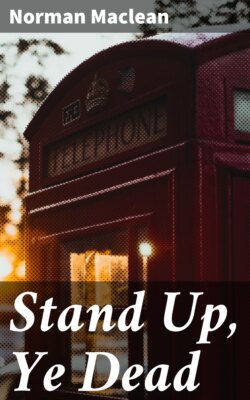Читать книгу Stand Up, Ye Dead - Norman Maclean - Страница 16
На сайте Литреса книга снята с продажи.
III
ОглавлениеIt is only when this disease, which is threatening the life of the body-politic, is probed, that the full extent of its ravages is manifest. For it is the educated, the cultured, and the rich who are eluding the responsibility of parentage, while the poor and the diseased are still continuing to multiply. In inverse ratio to the income and the size of house is the number of the children. It is the same sad story in every city. In London, the birthrate of Hampstead, a suburb mainly inhabited by the rich, fell from 30.01 in 1881 to 17.55 in 1911, while that of Shoreditch, a working-class district, only fell in the same period from 31.32 to 30.16. In his evidence before the Birthrate Commission, Dr. Chalmers, the Medical Officer of Health for the city of Glasgow, contrasted the birthrate in two of the poor districts of the city with that in two of the best districts. In the two worst wards the birthrate was equal to 161 per thousand married women between the ages of 15 and 45 years, whereas in the two well-to-do wards it was only 34.[2] In the city of Aberdeen, the birthrate in the poor and congested district of Greyfriars is almost double that of Rubislaw which includes the best housing in the city. In no city is this grim contrast more marked than in the city of Edinburgh.
When the different districts of Edinburgh are considered, it is apparent that in the poor districts the birthrate maintains still some vitality, but among the well-to-do and the rich it is rapidly diminishing. In the Canongate district there is a birthrate per thousand of 24; in Gorgie, 23.9; in St. Leonard's, 22.4; in Merchiston, 12.6; in Haymarket, 11.5; and in Morningside, 10.9. In the three districts of Edinburgh where the wealthy, the cultured, and the well-to-do abound, there the birthrate is but half of those districts where the poor, the miserable, and the criminal are congregated in noisome slums. In Morningside and Haymarket the birthrate is only a third of what it was in Scotland in 1871. These districts of the city have sacrificed two-thirds of their children to their ease. It is among the terraces and squares of the West Ends of great cities, and among the gardened villas of suburbs that this degeneration has evinced the fulness of its power. Where children could grow in health and happiness, thence selfishness has banished them; where, amid squalor, filth, and vice they are almost doomed from birth, there they are multiplied. Degeneration always begins at the top, and works downward. At the top only one-fourth are left; at the bottom, two-thirds are still left. But the dry-rot is creeping downward. The lower middle class is following its betters; and the artisan is following hard after. Only in the Canongate is the shouting of children at play still to be heard, and there the State surrounds the last survivors of the race with every temptation to evil and ruin.
This is a grim fact when the future of the race is considered; and of its grimness there can be no doubt. The vital statistics do not lie, and they are the proof. There are other proofs. The statistics of baptisms are steadily falling. In many West End congregations the sacrament of baptism has become a rarity! Sunday schools are getting smaller and smaller. The records of seven years (1908–14) showed the appalling fact that fourteen of the chief Free Church denominations of Britain have lost 257,952 scholars. The materials out of which the Church was formerly built are crumbling away. Empty cradles mean empty Sunday schools, empty classes, and, ere long, empty pews. The strangest thing is that in face of the forces that threaten destruction the Churches are silent—as if mesmerised! In these last years even the church-going population of this country was rapidly reverting to the base conditions in which Christianity found humanity, and from which the Cross in a measure rescued it. And the Church has lost the power of sounding the trumpet and warning the people of coming judgment.
